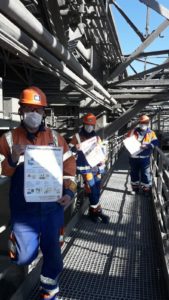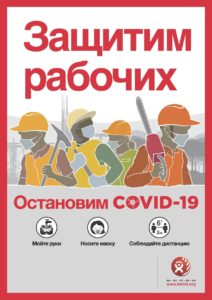
April 28 is the International Day of the Dead and injured at workplace

On the International Day of Remembrance of Employees, the Union of Professional Unions of Georgia joins the demand of the world trade unions, so that the Ministry of Internal Affairs of Labor and Health of Employers in the Workplace, recognizes as fundamental rights, as well as:

Right to effective recognition of freedom of union and collective negotiations;

Abolition of forced or compulsory labor;

Elimination of children’s labor;

Prohibition of discrimination in workplaces;
Every year 2,6 million people die from job related professional illness and injuries. The pandemic has made the situation even more difficult.
The pandemic has clearly shown us the vulnerable conditions in which employees and citizens are in. Evidence from all over the world proves that the virus is spreading in jobs and not only in healthcare and care, but also in factories, meat products, warehouses, schools, offices, transport and other sectors.
Therefore, it is especially important that labor safety and health be discussed in the rank of fundamental rights.
In addition, it is necessary to recognize Covid 19 as a professional disease.
Every 10 seconds in the world, one person dies due to labor safety standards deficiency. If lots of employees worked in shameful conditions before the pandemic, the situation got even worse today.
We urge the government to carry out comprehensible responsibilities to protect employers and community members who move into or touch with such employment areas. This is their fundamental right.
The 2019 declaration of the International Labour Organization, which governments, employers, and trade unions have been unanimously adopted, includes a promise to keep the employee healthy and safe in the workplace. The rules of the International Labour Organization also include such conditions. And the World Health Organization already recognizes health as a fundamental human right.
One of the main priority issues in labor relations for the Union of Georgia’s professional connections was and is labor safety, as far as human life and health are the greatest value.
Important steps have been taken to improve labor safety in Georgia in recent years to demand trade union. Laws on ′′ Labour Safety ′′ and ′′ Labor Inspection ′′ have been enacted. Labor Inspection Service has formed a separate public law legal personal with an increased mandate, which means overseeing labor standards in all economics.
The Labor Inspection Service Consultancy Organisation-Advisory Council has been established.
If we move forward in terms of the legislation regulating the above-mentioned labor safety and perfection, we cannot say the same about legislation.
Georgian legislative acts of so-called ′′ Technical Regulations ′′ that came into force since 2013, cover only some parts of economic activity. Accordingly, in areas where labor safety issues are not regulated by Georgian normative acts, employers and supervisors should be led by the Soviet normative acts in force before 1992 Supervision agencies in those areas of activity do not have legal mechanism for employers to arrest administrative houses.
It is necessary to improve labor safety in the country: refinement of the legislative base and strict enforcement of the law. The main indicators for assessing labor safety are statistics on industrial accidents and professional diseases. The latter is not calculated by the state until now.
Labor safety remains the main challenge in 2020, the number of deaths in jobs reached 39, and the number of injured reached 249
45 died in 2019, and 59 seriously injured in 168. 2018 were killed and 199 injured seriously. There is a sensible loss in the construction sector in terms of deaths between last year and 2019, in particular in 2020, 11 and 44 seriously injured, while 29 died in 2019 and seriously injured 54 A human being.
One of the important conditions for effective enforcement of the law is the number of labor inspectors in the country and the opening of regional structures. Today Georgia has only 53 labor inspectors, whose localization is only the capital.
We believe that it is important to take into account the state of labor safety and to reduce the accidents in the workplace and take into account the above-mentioned disadvantages of the state.
Global Solidarity – Labour Start 2023 conference launched in Tbilisi on April 28, which is also attended by representatives of the Confederation of Trade Unions of Armenia.
170 participants from 67 countries are represented at the conference.
The conference started with the respect of Workers’ Day and with the main idea that healthy and safe conditions are very important for workers.


